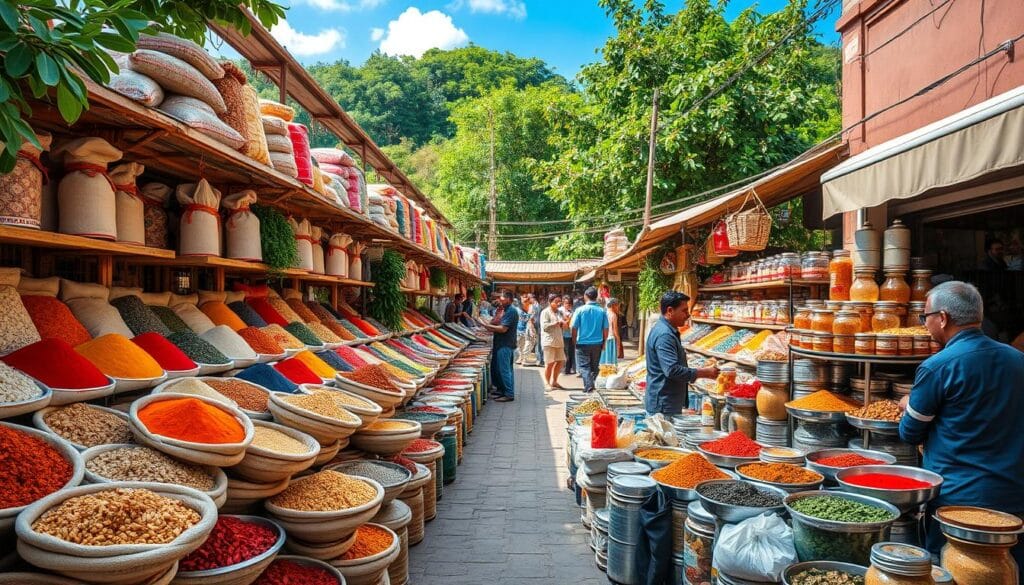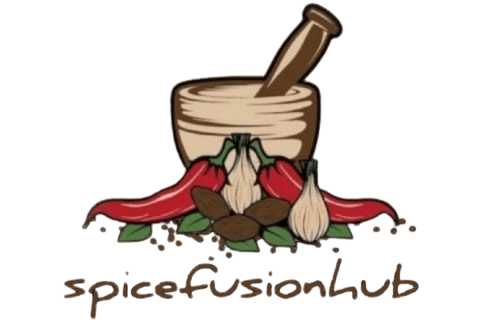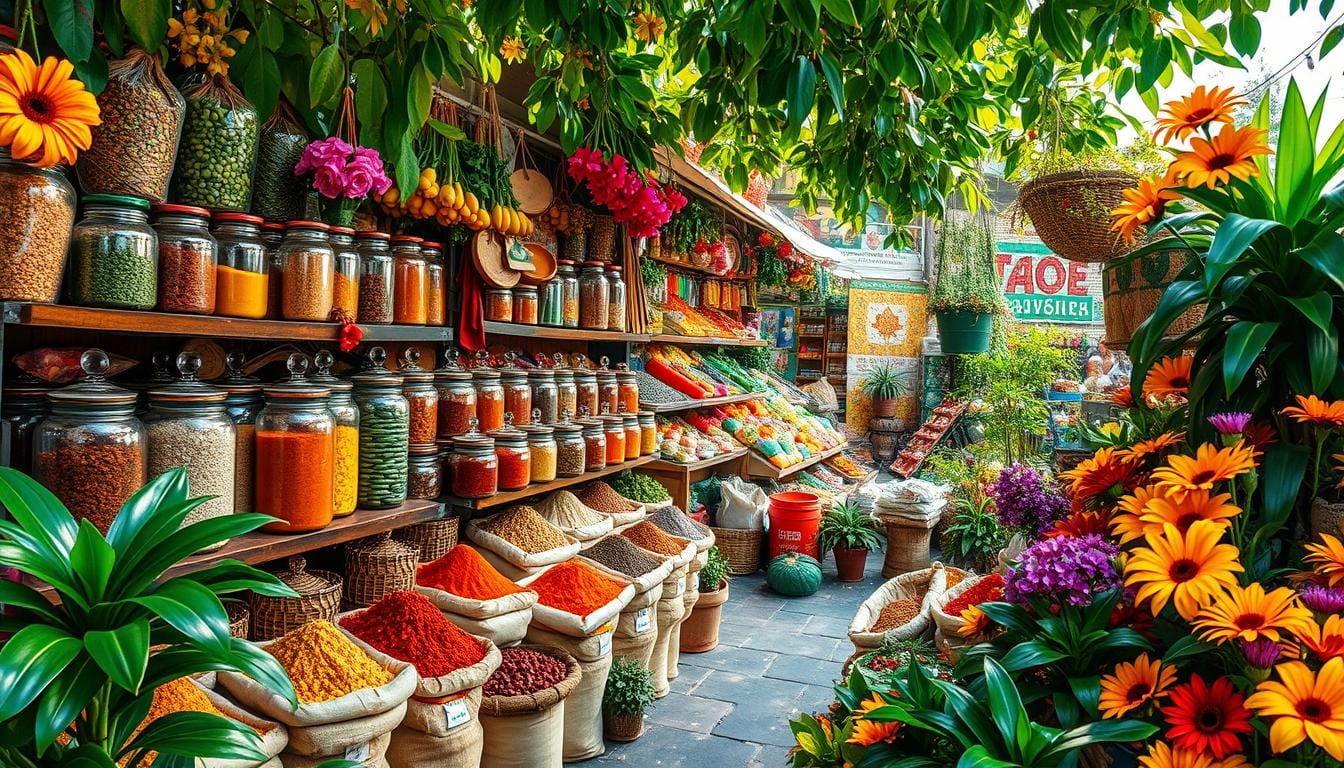Spice-Hunting Travel Adventures
Imagine a journey that awakens your senses. It’s a trip to stunning landscapes and the heart of local cultures through their flavors. A group of food lovers recently explored Kerala, India’s sun-kissed markets. They were drawn to the vibrant stalls filled with colorful spices.
One traveler was captivated by the bright red Kashmiri chili. She started a conversation with a local vendor. This simple talk turned into a deep dive into the world of spices and traditional dishes.
This adventure made them appreciate the world of spices. It opened their eyes to the exotic destinations waiting to be explored.
Welcome to the world of spice-hunting travel adventures. Every journey connects you with nature’s vibrant bounty and its rich history.
This article will guide you to remarkable destinations, essential packing tips, and unique culinary experiences. It’s for every adventurous soul eager to explore the world of spices.
Key Takeaways
- Spice-hunting travels offer a unique way to explore cultures through flavors.
- International spice markets are vibrant hubs of local tradition.
- Engage with farmers to learn about ethical harvesting practices.
- Cooking classes open doors to authentic culinary experiences.
- Understanding the history of spices enriches your travel adventure.
- Support local economies by participating in community events.
Introduction to Spice-Hunting Travel Adventures
Spice-hunting is a thrilling adventure into the world of spices. It explores their origins and uses in cooking. Travelers go on spice tours to local farms, plantations, and markets.
They see how spices are grown and harvested, learning about their flavors in global foods.
What is Spice-Hunting?
Spice-hunting is about guided tours that connect food and culture. It includes spice market tours and cooking demos. Travelers taste spices, learn their history, and visit local farms. This builds a deep respect for sustainable farming.
The Allure of Exotic Flavors
Exotic flavors draw many to spice exploration. Spice-hunting offers new tastes and cuisines. It’s a chance to meet local chefs and farmers, creating lasting memories and friendships.
Spices add history to meals, making them more than just food. For a spice-filled journey, check out this spice tour experience.
Top Destinations for Spice-Hunting
Exploring exotic spice destinations leads to exciting global spice adventures. These journeys are filled with unique flavors and cultural insights. India, Indonesia, and Madagascar are among the top places for spice-hunting.
Each offers a unique experience, showcasing the rich spice heritage of their cuisines.
India: The Spice Capital of the World
India is known as the spice capital of the world. It has many vibrant markets and diverse spices. Travelers can enjoy the lively markets, smelling saffron, cardamom, and turmeric.
Places like Kerala and Tamil Nadu offer guided tours. These tours give insights into the spice trade and local cooking traditions.
Indonesia: A Spice Island Paradise
Indonesia is famous for its spice islands. The Banda Islands are a must-see, with their nutmeg and cloves. Plantation tours let visitors see the spice trade’s history up close.
These tours are engaging, showing Indonesia’s importance in the global spice market.
Madagascar: Uncover Unique Flavors
Madagascar is known for its unique flavors, like vanilla and black pepper. Its stunning landscapes make spice-hunting even more special. Visitors can join local activities to learn more about spices and the people who grow them.
Preparing for Your Spice-Hunting Journey
Starting a spice-hunting adventure needs careful planning for a memorable trip. Knowing what to bring and researching local spice markets and farms will make your culinary journey better.
Essential Packing Tips
When going on spice tours, pack light but practical. You’ll need:
- Lightweight clothes for warm weather.
- Comfortable shoes for walking and exploring.
- A journal to write down your spice finds and food experiences.
These items will make your trip more fun and easy. Learning about local spice customs helps you connect with people during your travels.
Researching Spice Markets and Farms
Spending time researching famous spice markets and farms can make your journey better. Places like India and Indonesia offer unique experiences. You can help with local spice harvesting and learn about different spices.
Websites like Eat My Globe share the history of spices. They help you know what to look forward to on your culinary adventures.

Unique Spice Experiences to Explore
Traveling is a great way for food lovers to explore spices. By going on spice plantation tours and cooking classes, you learn a lot. These activities are key for anyone who loves trying new foods and exploring different tastes.
Spice Plantation Tours
Spice plantation tours show you how spices go from the farm to your plate. You get to walk through colorful plantations and learn about the spices. Local farmers share their knowledge, making the experience even more special.
Walking among the plants, you’ll get to smell the spices. This makes you appreciate the flavors in different foods even more.
Cooking Classes in Local Kitchens
Cooking classes in local kitchens are a hands-on way to learn. You get to use fresh spices in traditional dishes. This lets you see how spices change the taste of food.
By making your own dishes, you learn cooking skills. And you get to enjoy what you’ve made. It’s a great way to make your food trips even more memorable.
Understanding the Role of Spices in Culture
Spices are more than just cooking ingredients. They hold deep cultural meaning worldwide. Their history has shaped societies, influencing trade, food, and daily life.
Exploring spice use in different cultures makes culinary travel to exotic places even more rewarding.
Historical Significance of Spices
Spices have played a key role in history as trading goods. They sparked the creation of trade routes, connecting far-off lands. This led to cultural exchanges, impacting art, language, and society.
Places like the Middle East and Asia were key in the spice trade. They produced many flavors we love today.
Spices in Traditional Cuisines
Spices are vital in traditional cuisines worldwide, adding flavor to dishes. In India, they make curries and biryanis rich. Indonesian dishes like rendang, a beef stew, also highlight spice use.
These examples show how spices connect food to culture. They make culinary travel experiences unique and meaningful.
Engaging with Local Communities
Exploring spices is more than just visiting markets and plantations. It’s about connecting with local people. Meeting the farmers who grow the spices gives you a peek into their hard work and dedication.
These moments often lead to amazing stories and insights about the spices.
Meeting Local Farmers
Traveling for spice adventures means meeting local farmers. This gives you a unique view of how spices are grown. You’ll learn to appreciate the effort it takes to bring spices to market.
Farmers share their knowledge and the cultural importance of their crops. You might even get to help out, learning more about farming practices.
Participating in Cultural Festivals
Cultural festivals are a great way to connect with locals. These events celebrate harvests and share traditional customs. You can enjoy local rituals, listen to traditional music, and try authentic dishes.
These festivals create lively, shared experiences. They make unforgettable memories and deepen your connection to the spice culture.

Sustainability in Spice-Hunting
Sustainability is key in spice-hunting and culinary travel. Travelers looking to taste spices can help the environment and local communities. They can choose to support ethical harvesting, which respects the earth and its resources.
Ethical Harvesting Practices
Starting with sustainability in spice-hunting means learning about ethical harvesting. Many farmers use organic methods to lessen environmental harm.
These methods keep the area’s biodiversity intact, letting travelers enjoy real flavors without harming the ecosystem.
Organic spices are good for the planet and taste better too.
Supporting Local Economies
Buying spices from local producers helps local economies. It helps farmers and keeps traditional farming alive. Many places offer fair trade, helping improve farmers’ lives.
Buying local products during culinary travel connects you to the culture and people behind the flavors.
| Practice | Description | Impact |
|---|---|---|
| Organic Farming | Using natural methods to grow spices without chemicals | Preserves biodiversity and enhances flavor quality |
| Fair Trade | Trading practices that ensure fair wages for farmers | Supports community development and sustainable livelihoods |
| Direct Purchasing | Buying spices directly from local farmers | Empowers local economies and strengthens cultural ties |
The Health Benefits of Spices
Spices do more than just add flavor to your food. They can greatly improve your health and nutrition. By trying different spice-rich dishes, you can enjoy tasty meals and get healthier.
Spices and Nutrition
Many spices are full of nutrients, helping you eat well. Turmeric has curcumin, which fights inflammation. Ginger helps with digestion and can stop nausea. Garlic is good for your heart and can lower blood pressure.
Adding these spices to your meals makes them not only taste better but also more nutritious.
Healing Properties of Common Spices
Spices have been known for their healing powers for a long time. Here are some common ones to try:
- Cinnamon: Helps control blood sugar.
- Black Pepper: Improves digestion and nutrient absorption.
- Chili Peppers: Capsaicin boosts metabolism.
- Oregano: Full of antioxidants, supports the immune system.
Exploring local cuisines lets you enjoy vibrant flavors and health benefits of spices. It makes your culinary journey both tasty and healthy.
Conclusion: Your Next Spice-Hunting Adventure Awaits
Spice-hunting travel adventures let you dive into different cultures and enjoy a wide range of flavors. We’ve explored places like India, Indonesia, and Madagascar, each known for its special spices.
Before you go, learn about local markets and sustainable practices to make your trip even better.
Recap of Key Points
Spices have a long history and play a big role in many cuisines around the world. By connecting with local farmers and joining cultural events, you can truly enjoy the flavors of your travels.
You’ll also support local economies and help with sustainable farming.
Encouragement to Explore New Flavors
Ready to explore the spice markets of Kerala or try the dishes of Bali? Spice-hunting is waiting for you. It’s a chance to discover new tastes and learn about the traditions behind them.
Start your spice-hunting adventure today and see where it takes you!







